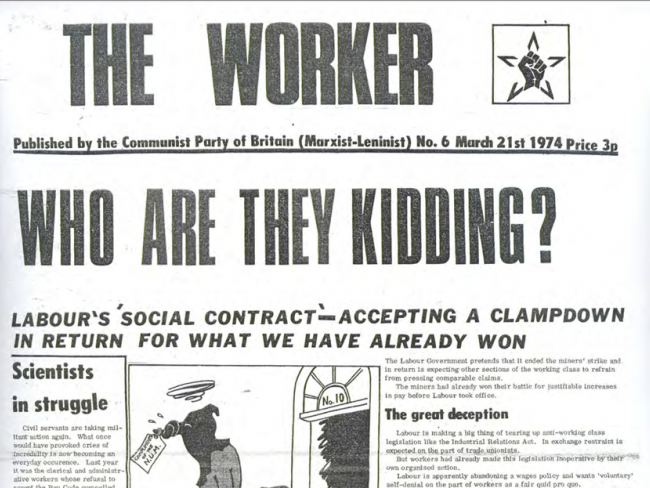
Headline from The Worker in 1974, warning of the dangers of the new Social Contract.
Heightened class struggle in the early 1970s was neutered by a Labour government and trade union establishment working in tandem…
Many confident working class struggles erupted in the early 1970s across a huge range of disputes and sectors. The highlights were the engineering union’s destruction of the 1971 Industrial Relations Act and the miners’ victory over the imposition of a three-day week.
After this tricky period for the Establishment, the incoming 1974 Labour government stabilised capitalism, coordinating moves to dampen down industrial action. It preached class conciliation by dangling bribes to the unions in exchange for moderation of wages.
The Labour government promised to repeal the Industrial Relations Act, introduce food subsidies and freeze council rent increases. In return, the Trades Union Congress (TUC) said it would ensure union cooperation in submitting to voluntary wage restraint “to combat rising inflation” – the Social Contract.
Ted Heath’s Conservative ministry (1970-74) had failed to control the enormous surge of industrial struggle fuelled by opposition to anti-union legislation and rampant inflation. The new Labour government aimed for organised labour to cooperate with the state and to drop the turbulent industrial relations of the previous period. The TUC willingly agreed.
In March 1974, our Party warned that Labour’s Social Contract meant the working class accepting a clampdown in return for what they had already won by themselves. The Labour government pretended it ended the miners’ strike; it did not – the miners had effectively won their battle for wage increases before Labour took office. But Labour expected other workers to refrain from pressing comparable claims.
Labour also made a big play about tearing up anti-working class legislation like the Industrial Relations Act. Another distortion: workers led by the engineering union had already made this legislation inoperative by their own organised resistance and strike actions.
Workers were sold the big lie that what already had been won by their own struggle was really a gift of the Labour government. It also peddled the fairy tale that if workers were moderate in their demands, they would be better protected than by taking industrial action for higher wages.
The reality was different – workers accepted greater exploitation, and the government abandoned “voluntary” wage restraint. But the Labour government and the TUC were taking on more than pay claims.
Corporate state
In June 1974 the CPBML spelled out the risks in this way: “The Labour Party is the major vehicle for the advancement of the corporate state; a fascist state rule which seeks to destroy the weapons of workers’ struggle and to subjugate the working class. The Labour Party’s pernicious role is to attempt to secure the acquiescence of the working class to its own enslavement…
“The right of collective bargaining, like the emancipation of the working class, is not something which can be bestowed on us from high. It can only be won and maintained by our own continuous struggle.”
By July 1975, the Labour government was no longer prepared to tolerate voluntary wage restraint. It introduced a formal incomes policy within the Contract to operate in stages over the following four years.
‘Workers were sold the big lie that what had already been won by their own struggles was a gift from Labour…’
At first the Labour government managed to prevent pay rises generally exceeding the “agreed” level – in other words, the cap it dictated. But the capitalist economy continued to deteriorate in Britain, and the government’s sweetheart promises did not fully materialise.
High rates of inflation, rising unemployment, an IMF loan, deflationary spending cuts and interest rate increases exposed the one-sided nature of trade union commitments to the Contract. Observance began to fray and trade union members called for wage increases in line with and above inflation. By September 1977 the annual TUC conference voted decisively for a return to collective bargaining within the next year.
Army deployed
Yet the trade unions mostly continued to support the government, at least to the extent of not rocking the boat or openly challenging it and discouraged any others from doing so. The most notable example was the TUC’s refusal to support the Fire Brigades Union strike in November 1977 for a pay rise greater than allowed under the Contract. The government deployed the army, won the dispute and the Contract remained just about intact.
By 1978 the limits on pay increases under the Social Contract were unacceptable in the face of a deteriorating quality of living faced by most workers. Even then the TUC continued to avoid confrontation with the government.
Then on 22 September 1978 a strike started at Ford Motor Company. It lasted eight weeks and ended with Ford offering a 17 per cent pay rise to their workers. The Labour government failed to pass a bill through parliament to apply sanctions against Ford for breaking the 5 per cent pay limit. The Social Contract was effectively broken.
Class conciliation, especially when it seeks to constrain future actions, inevitably veers towards class collaboration so long as ruling class interests remain in control
The practice of the Social Contract led to the voluntary emasculation of trade unions and a greater passivity on the part of the working class. The ruling class will always attempt to bind workers to promises of restraint, but will always excuse themselves from commitments when they deem it necessary. But it’s folly for workers to voluntarily surrender control to the opposing class
Hopefully we learn from the mistakes of the past. We should beware any calls for a new Labour government being encouraged into office to forge a new social contract in return for the repeal of anti-trade union legislation, the provision of energy subsidies, or a freeze on rent and mortgage increases.
• A longer, more detailed analysis is available online at cpbml.org.uk
